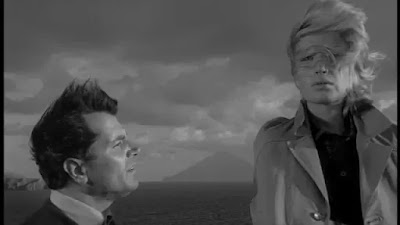Michelangelo Antonioni – L’Avventura (1960)
An Exploration of the Mind’s Quiet Spaces
“Michelangelo always went beyond words to meet the silence, the mystery, and the power of silence.”
—Enrica Antonioni
A boat glides slowly toward the shore of a rocky island. One by one, the passengers step onto land. A quarrel between a man and a woman. Sunbathing. The wind picks up...
From the very beginning, L’Avventura unfolds as something more than a narrative—it’s a landscape of mood, silence, and ambiguity.
I was struck by Aldo Scavarda’s cinematography. He floods the screen with one breathtaking composition after another: jagged cliffs, dark rainclouds drifting across distant skies, and starkly deliberate frames. There is a plot, yes—someone from the group goes missing. But this is no mystery film in the traditional sense.
Antonioni gave audiences this premise over sixty years ago: a boating trip, a missing woman. What happened?
A Story of Unresolved Emotions
L’Avventura is a film of tensions left unresolved, a kind of ritual where loss, contradiction, and longing move side by side. It’s difficult to pin down exactly what happens—what matters is the moment. The characters drift in and out of clarity like mirrors catching passing thoughts.
When dialogue emerges, it’s sparse but weighty. Characters speak as if their inner voices are rowing in opposite directions. These internal frictions become the true language of the film—Antonioni's slow-burning barometer of confusion, restlessness, and human disconnection.
Images that Speak in Silence
There’s a moment when Monica Vitti runs across a room, and I freeze. The frame is divided: on the left, a richly decorated interior with small sculptures perched on ornate supports; on the right, an open balcony with hills undulating in the background. The shot is pure visual poetry.
Antonioni’s images don’t just show—they evoke. His films feel like fragments of truth embedded in silence. An everyday mysticism begins to wrap itself around us. Something broken and human always lingers beneath the surface. Everything in his world feels uncertain, fluid—often even foreign.
Why Can’t Things Be Less Complicated?
Monica Vitti’s face is etched with quiet desperation. She rings church bells until she simply stares into the void.
“Why can’t things be less complicated? I like to be clearheaded…”
she sighs. And who among us hasn’t thought the same?
With a few lines and a handful of images, Antonioni captures something essential. Not answers, but questions—about contradiction, about choices, about the in-between.
A Monument of Modern Italian Cinema
L’Avventura is a towering achievement of modern Italian cinema. It’s independent, introspective, and monumental. It holds both beauty and despair—both delicacy and ugliness. That duality makes it human. And that’s precisely what makes it a great film.
More than anything, L’Avventura lives up to its title. It is an adventure—not across oceans or landscapes, but deep into the uncharted terrain of the human psyche.
Director: Michelangelo Antonioni
Cinematography: Aldo Scavarda
Screenplay: Michelangelo Antonioni
Cast: Monica Vitti, Gabriele Ferzetti, Lea Massari, Dominique Blanchar

Comments
Post a Comment